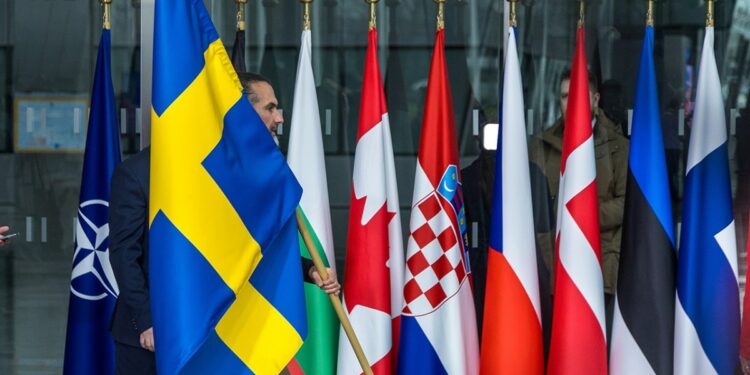In the United States, we surveyed 3,600 U.S. adults from April 1 to April 7, 2024. Everyone who took part in this survey is a member of the Center’s American Trends Panel (ATP), an online survey panel that is recruited through national, random sampling of residential addresses. This way nearly all U.S. adults have a chance of selection. The survey is weighted to be representative of the U.S. adult population by gender, race, ethnicity, partisan affiliation, education and other categories. Read more about the ATP’s methodology.
Throughout the report, we analyze respondents’ attitudes based on where they place themselves on an ideological scale. We asked about political ideology using several slightly different scales and categorized people as being on the ideological left, center or right.
In most countries, we asked people to place themselves on a scale ranging from “Extreme left” to “Extreme right.” The question was asked this way in Argentina, Bangladesh, Brazil, Canada, Chile, Colombia, France, Germany, Greece, Hungary, Israel, Italy, Mexico, the Netherlands, Nigeria, Peru, the Philippines, Poland, South Africa, Spain, Sweden, Turkey and the United Kingdom.
In Australia, the scale ranged from “Left” to “Right”.
In Japan, Singapore, South Korea and Thailand, ideology was measured on a scale from “Extremely progressive” to “Extremely conservative.”
Ideology was not asked about in Ghana, India, Kenya, Malaysia, Sri Lanka or Tunisia.
To compare educational groups across countries, we standardize education levels based on the UN’s International Standard Classification of Education (ISCED).
To compare views of those who support the governing party or parties with those who do not, we grouped respondents based on their answers to a question asking them which political party, if any, they identified with in their country. For more, including country specific classifications, read our Political Categorization Appendix.
Prior to 2024, combined totals were based on rounded topline figures. For all reports beginning in 2024, totals are based on unrounded topline figures, so combined totals might be different than in previous years. Refer to the 2024 topline to see our new rounding procedures applied to past years’ data.
Here are the questions used for the report, along with responses, and the survey methodology.
Ahead of a July 2024 summit marking the 75th anniversary of NATO’s founding, the trans-Atlantic alliance continues to be seen largely favorably in select member nations. A median of 63% of adults across 13 member countries surveyed have a positive opinion of NATO, while 33% have a negative opinion.
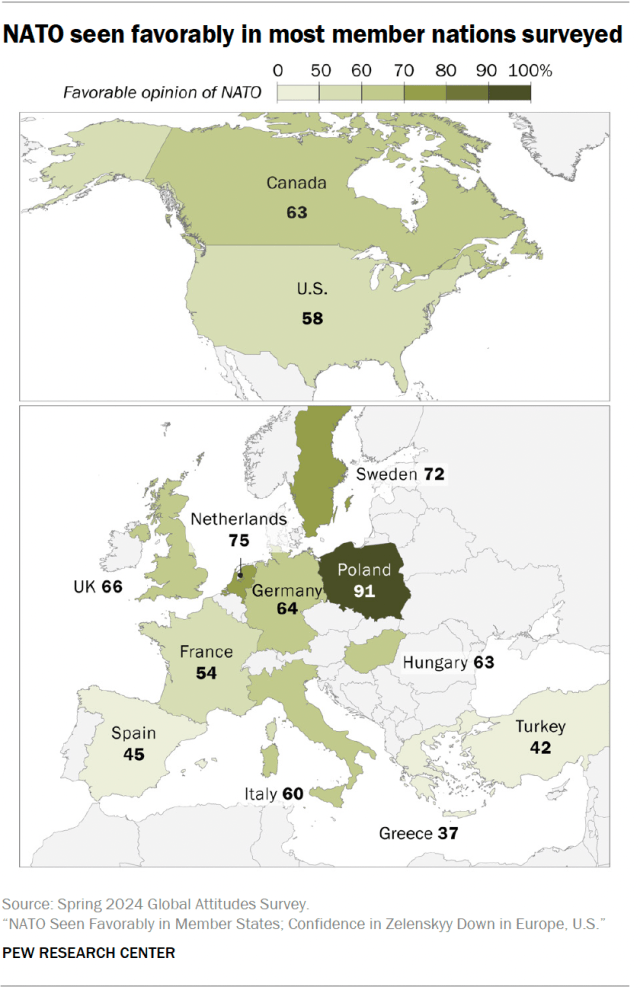
More than two years since Russia’s invasion of Ukraine, ratings for Ukrainian President Volodymyr Zelenskyy are mixed in a broader set of 35 NATO and non-NATO countries we surveyed. A median of 40% of adults across these countries have confidence in Zelenskyy to do the right thing regarding world affairs, while 46% do not. Majorities in just seven countries have confidence in his ability to navigate international affairs. And confidence in him has dropped significantly across several countries in Europe and North America.
Global views of Russia and its leader, President Vladimir Putin, have remained very negative since the conflict began in 2022, though opinions have warmed slightly in several countries since we last surveyed there.
For this report, we surveyed 44,166 adults in 35 countries from Jan. 5 to May 21, 2024. In addition to this overview, the report includes chapters on:
Read some of the report’s key findings below.
Views of NATO have changed in several countries
Favorable views of NATO are up significantly in Turkey since our last survey there in 2019. And Hungarians have also grown more favorable toward the alliance in the past year. However, in a handful of places – including Spain, Sweden, the United Kingdom and the United States – positive views of NATO have ticked down slightly since 2023. (For more on views of NATO over time, read Appendix A.)
In Hungary, Poland and Turkey, we asked respondents whether NATO membership is important for their country’s security. More than eight-in-ten adults in Hungary and Poland say it is important, and roughly six-in-ten share this belief in Turkey.
Confidence in Zelenskyy varies across Europe – and has declined in some places
In Europe, confidence in the Ukrainian president varies significantly by country. Eight-in-ten adults in Sweden have confidence in Zelenskyy; a roughly equal share in Hungary do not.
Confidence in Zelenskyy has decreased significantly in many countries since 2023. The drop is largest in Poland, where confidence in him has dropped 22 percentage points since last year.
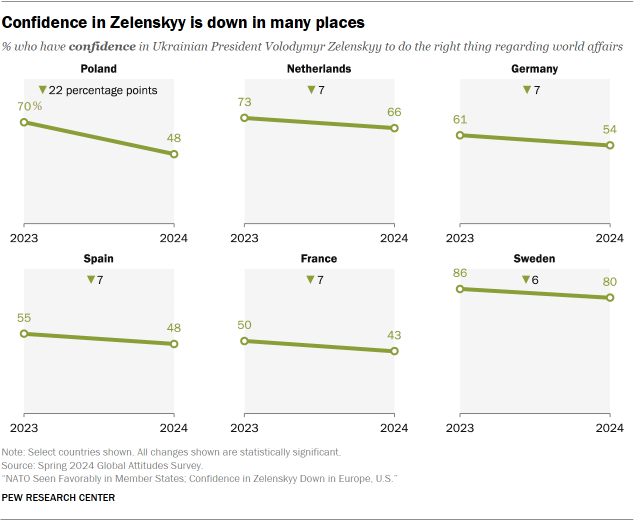
Little consensus on support for Ukraine
Publics in four countries – the U.S., Turkey, Hungary and Poland – differ widely on whether their country is providing enough support to Ukraine.

Roughly a quarter of Americans (24%) now say the U.S. is not providing enough aid to Ukraine, up from 18% in November 2023, when we last asked this question. Still, more Americans (31%) think the U.S. is providing too much aid, and 25% believe it’s giving the right amount.
A majority of Hungarians (61%) and a plurality of Turks (46%) say their country is giving about the right amount of aid to Ukraine. Poles are more divided: While 45% say their country is giving the right amount of support, a nearly identical share (44%) say it is providing too much.
Related: Growing Partisan Divisions Over NATO and Ukraine
Views of Russia, Putin have warmed in some places
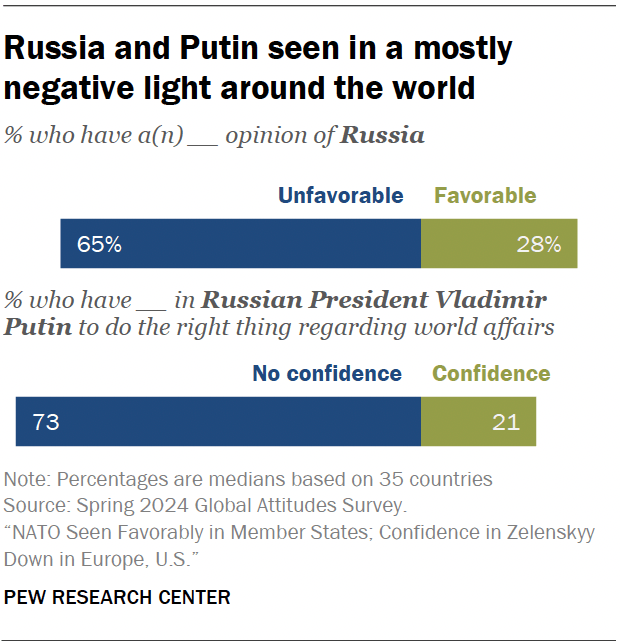
Views of Russia and Putin remain largely negative across 35 countries polled: A median of 65% have an unfavorable view of Russia and 73% lack confidence in the Russian leader to do the right thing regarding world affairs.
But in a handful of countries, opinions of Russian and Putin have warmed since we last surveyed there. Argentines, for example, have grown 11 percentage points more favorable toward Russia and 9 points more confident in Putin over the past year. (For more on views of Russia and Putin over time, read Appendix A.)
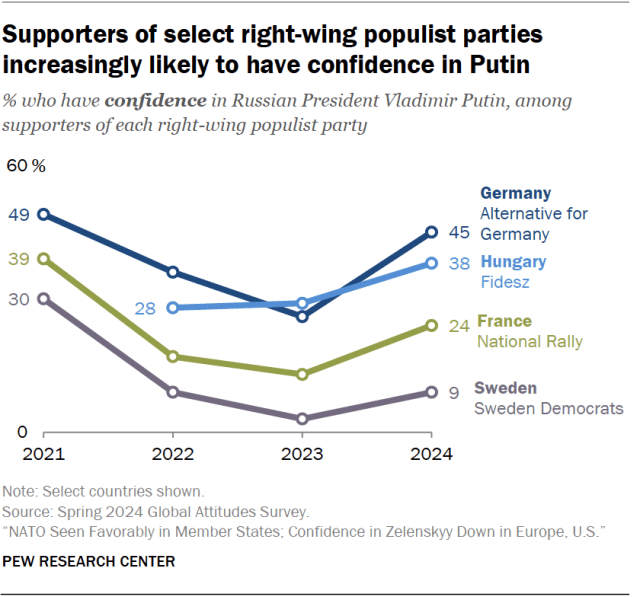
In several European countries, people who have a favorable view of a right-wing populist party in their country see Russia and Putin more positively than do people with unfavorable views of those parties. While ratings for Russia and Putin among some right-wing populists dropped sharply in 2022 and 2023 (our 2022 fieldwork largely took place during the early weeks of Russia’s invasion of Ukraine) favorability and confidence are creeping back up in a few countries.
In Germany, for example, about a quarter (26%) of supporters of Alternative for Germany (AfD) had confidence in Putin in 2023. Now, 45% do, an increase of 19 points and close to preinvasion levels of confidence. The same pattern appears elsewhere, too. (For more information on how we categorize populist party support, read Appendix C.)
Country spotlight: Turkey
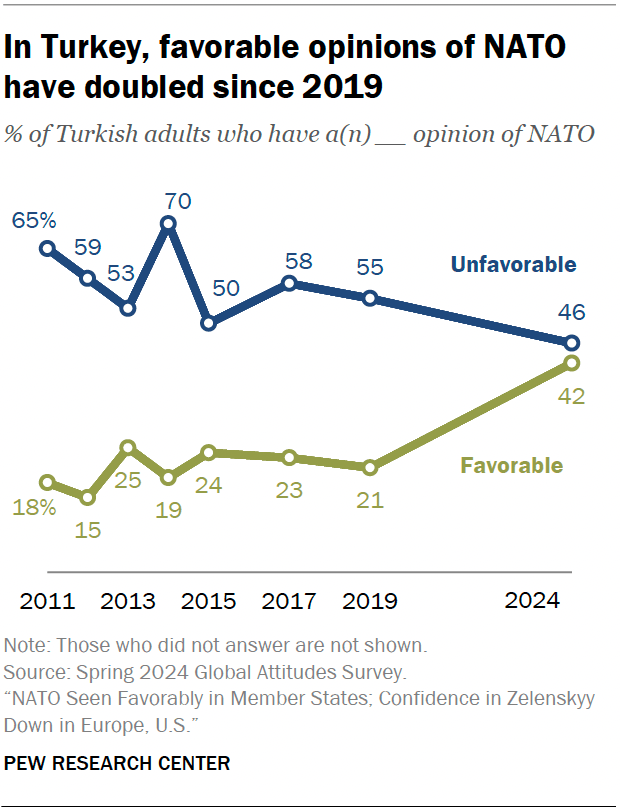
Favorable views of NATO historically have been much lower in Turkey than in other NATO members states, according to our previous surveys. Before this year, no more than a quarter of adults in Turkey had a positive view of the long-standing treaty organization, which Turkey joined in 1952.
However, the share of Turks with a positive view of NATO has nearly doubled since 2019, when we last surveyed in the country. Today, 42% have a favorable opinion of the alliance, up from 21% in 2019. Fewer Turks now hold unfavorable opinions or have no opinion of it. A majority (61%) also say membership in NATO is very or somewhat important to their country’s security. Still, favorability of NATO in is lower in Turkey than in many of the other member states we polled.
Turks are quite negative toward Russia and Putin: More than six-in-ten express an unfavorable view of Russia or have no confidence in its leader. Those on the ideological left are more likely than those on the right to have a negative opinion of Russia and to lack confidence in Putin. And those who have a favorable opinion of Turkish President Recep Tayyip Erdoğan are about twice as likely to express a positive view of Russia as those who have an unfavorable view of Erdoğan.
Turks’ views of Zelenskyy are similar to their views of Putin. Only 31% of Turks have confidence the Ukrainian president, while 60% have no confidence. A plurality (46%) say their country is providing about the right amount of support to Ukraine, while 20% say it is not providing enough support and 16% it is providing too much; another 18% did not answer.
Country spotlight: Poland
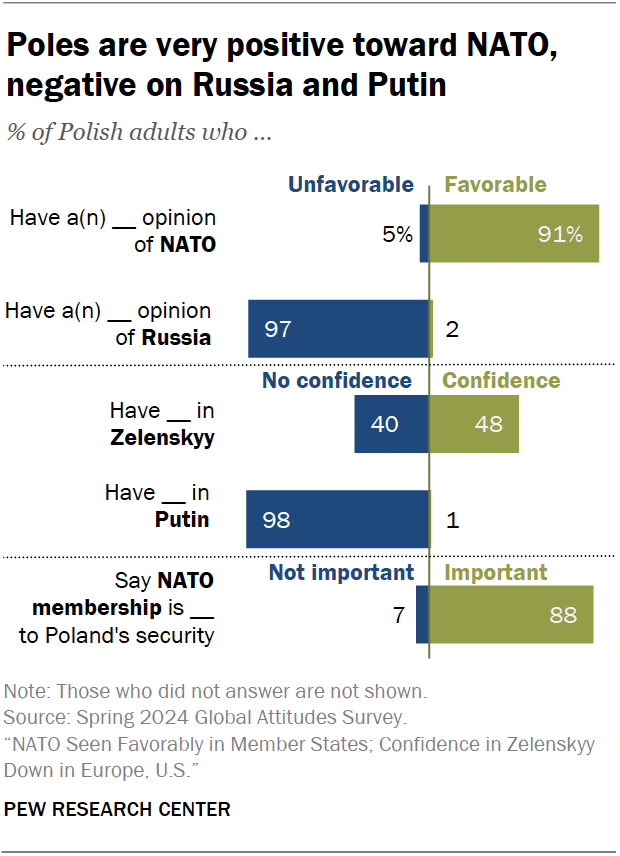
Poles stand out among the publics we surveyed for their very positive opinions of NATO and very negative views of Russia and Putin.
Roughly nine-in-ten adults in Poland have a favorable view of NATO, the highest share among the member states polled. And 88% consider their country’s membership in NATO important to national security, including a 55% majority who say it is very important.
Poles are nearly united in their negative sentiments toward Russia and its leader: 97% have an unfavorable view of Russia and 98% have no confidence in Putin on the world stage.
However, they are more divided on Ukraine’s leader: 48% are confident in Zelenskyy to do the right thing regarding world affairs, while 40% have no confidence in him. During the fieldwork period for this survey, a farmer-led blockade in Poland over the low price of imported grain from neighboring Ukraine caused friction between the two countries.
Country spotlight: Sweden
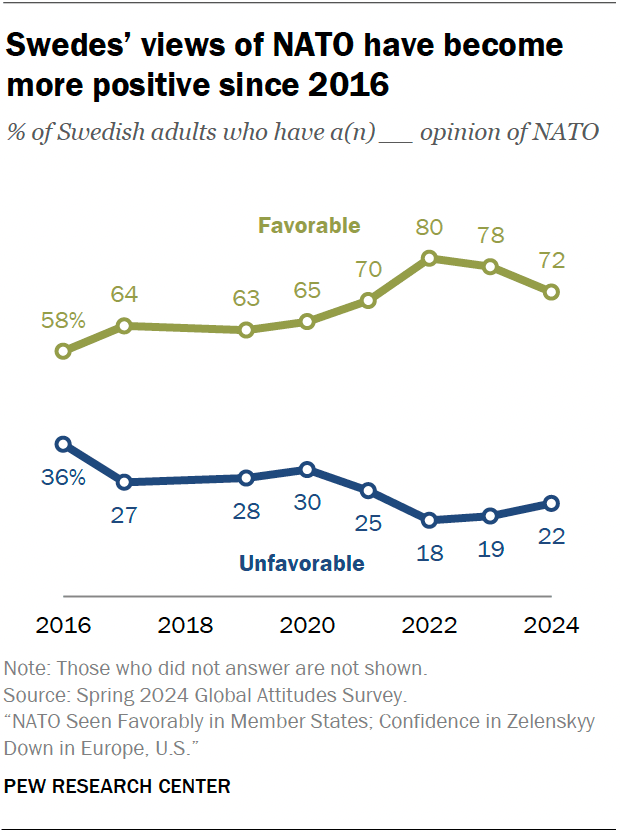
NATO is popular in Sweden, which formally became a member of the alliance in March 2024, just before our fieldwork for this survey began there. About seven-in-ten Swedes have a positive view of NATO, while 22% have a negative opinion.
The share of Swedes with a positive view of NATO is down slightly from 80% in 2022. That year, our fieldwork in Sweden began the same day as Russia’s invasion of Ukraine – and Swedes grew increasingly positive about NATO as our fieldwork went on.
People in Sweden express strongly unfavorable views of Russia and Putin, though they rank just below Poland in the strength of these sentiments. And 80% of Swedes have confidence in Zelenskyy, the highest share across all 35 surveyed countries.
Source link : https://www.pewresearch.org/global/2024/07/02/nato-seen-favorably-in-member-states-confidence-in-zelenskyy-down-in-europe-us/
Author :
Publish date : 2024-07-02 13:52:44
Copyright for syndicated content belongs to the linked Source.

